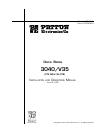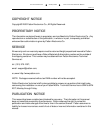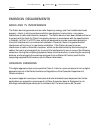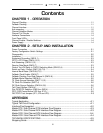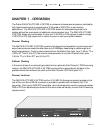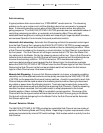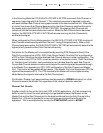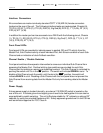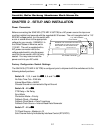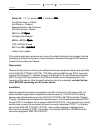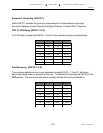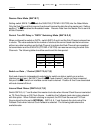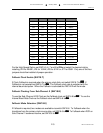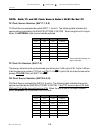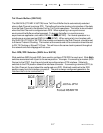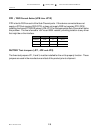
3040/V35
139001UA
1-3
INSTALLATION AND OPERATIONS MANUAL
OPERATION
PATTON ELECTRONICS CO.
In the Scanning Mode the CTS 3040/V35 (CTS MD-V.35/TCB) scans each Sub-Channel, in
sequence, beginning with Sub-Channel 1. This rotational sequence is repeated continually
with each attached Sub-Channel having equal access to the communications link. When data
or control lines from a Sub-Channel become active that Sub-Channel is switched through to
the master port by the 3040/V35 (CTS MD-V.35/TCB). All remaining Sub-Channels are
locked out until the first device becomes inactive. When the Sub-Channel device becomes
inactive, the 3040/V35 (CTS MD-V.35/TCB) will resume scanning the Sub-Channels for
another active signal.
When configured for Priority Mode operation, the 3040/V35 (CTS MD-V.35/TCB) monitors all
Sub-Channels simultaneously with Sub-Channel 1 having the highest priority. When a Sub-
Channel becomes inactive, the 3040/V35 (CTS MD-V.35/TCB) will automatically default to the
highest priority (lowest number) Sub-Channel with activity.
Contention for the Master port is accomplished by asserting RTS (Request to Send) if the
Sub-Port is configured as a DCE, DCD (Data Carrier Detect) if the Sub-Port is configured as
a DTE or Data Transitions from the attached Sub-Channel devices in either configuration. The
active interface lead, RTS or DCD, as well as selection of contention mode,
“Data Transitions”
or
“Interface Lead”
activation, can be selected on an individual basis for each Sub-Channel.
Once a Sub-Channel asserts an active control signal the control signal will be passed through
to the Master Port, depending on DTE / DCE configuration of the Sub-Channel and Master
Port. This control will be passed without delays. If the Master Port is configured as a DTE the
signal will be passed as RTS. The CTS returned to the Master will have an optional delay
added before the signal is returned to the Sub-Channel port.
Port Enable / Disable, front panel switches must be pushed in (GREEN indication) for a Sub-
Channel to access the Master Port regardless of the mode of operation selected.
Channel Tail Circuits
A buffer is built into the unit for tail circuit (DCE to DCE) applications. An 8 bit centered ring
buffer is used to correct the clock phasing errors generated between the Modem on the
Master Port and the Sub-Channel port for the data transferred from the Sub-Channel to the
Master Port. If the unit is operated in an asynchronous environment the buffer must be
bypassed. This is accomplished by moving the SYNC/ASYNC switch to ASYNC.



